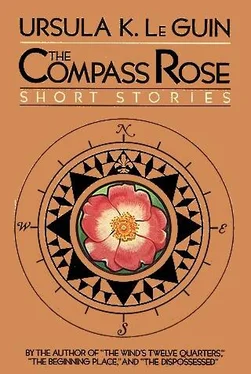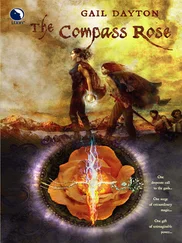I panicked, and tried again to turn the lights on.
It was a man, lying there in a long thin heap. I thought a burglar had got in somehow while I was away, and died. I opened the door so I could get out quick or at least my yells could be heard, and then I managed not to shake long enough to strike a match, and lighted the candle, and came a little closer to the bed.
The light disturbed him. He made a sort of snoring in his throat, and turned his head. I saw it was a stranger, but I knew his eyebrows, then the breadth of his closed eyelids, then I saw my husband.
He woke up while I was standing there over him with the candle in my hand. He laughed and said still half asleep, “Ah, Psyche! from the regions which are holy land.”
Neither of us made much fuss. It was unexpected, but it did seem so natural for him to be there, after all, much more natural than for him not to be there; and he was too tired to be very emotional. We lay there together in the dark, and he explained that they had released him from the Rehabilitation Camp early because he had injured his back in an accident in the gravel quarry, and they were afraid it might get worse. If he died there it wouldn’t be good publicity abroad, since there have been some nasty rumors about deaths from illness in the Rehabilitation Camps and the Federal Medical Association Hospitals; and there are scientists abroad who have heard of Simon, since somebody published his proof of Goldbach’s Hypothesis in Peking. So they let him out early, with eight dollars in his pocket, which is what he had in his pocket when they arrested him, which made it, of course, fair. He had walked and hitched home from Coeur D’Alene, Idaho, with a couple of days in jail in Walla Walla for being caught hitchhiking. He almost fell asleep telling me this, and when he had told me, he did fall asleep. He needed a change of clothes and a bath but I didn’t want to wake him. Besides, I was tired too. We lay side by side and his head was on my arm. I don’t suppose that I have ever been so happy. No; was it happiness? Something wider and darker, more like knowledge, more like the night: joy.
It was dark for so long, so very long. We were all blind. And there was the cold, a vast, unmoving, heavy cold. We could not move at all. We did not move. We did not speak. Our mouths were closed, pressed shut by the cold and by the weight. Our eyes were pressed shut. Our limbs were held still. Our minds were held still. For how long? There was no length of time; how long is death? And is one dead only after living, or before life as well? Certainly we thought, if we thought anything, that we were dead; but if we had ever been alive, we had forgotten it.
There was a change. It must have been the pressure that changed first, although we did not know it. The eyelids are sensitive to touch. They must have been weary of being shut. When the pressure upon them weakened a little, they opened. But there was no way for us to know that. It was too cold for us to feel anything. There was nothing to be seen. There was black.
But then—“then,” for the event created time, created before and after, near and far, now and then—“then” there was the light. One light. One small, strange light that passed slowly, at what distance we could not tell. A small, greenish-white, slightly blurred point of radiance, passing.
Our eyes were certainly open, “then,” for we saw it. We saw the moment. The moment is a point of light. Whether in darkness or in the field of all light, the moment is small, and moves, but not quickly. And “then” it is gone.
It did not occur to us that there might be another moment. There was no reason to assume that there might be more than one. One was marvel enough: that in all the field of the dark, in the cold, heavy, dense, moveless, timeless, placeless, boundless black, there should have occurred, once, a. small,slightly blurred, moving light! Time need be created only once, we thought.
But we were mistaken. The difference between one and more-than-one is all the difference in the world. Indeed, that difference is the world.
The light returned.
The same light, or another one? There was no telling.
But, “this time,” we wondered about the light: was it small and near to us, or large and far away? Again there was no telling; but there was something about the way it moved, a trace of hesitation, a tentative quality, that did not seem proper to anything large and remote. The stars, for instance. We began to remember the stars.
The stars had never hesitated.
Perhaps the noble certainty of their gait had been a mere effect of distance. Perhaps in fact they had hurtled wildly, enormous furnace fragments of a primal bomb thrown through the cosmic dark; but time and distance soften all agony. If the universe, as seems likely, began with an act of destruction, the stars we had used to see told no tales of it. They had been implacably serene.
The planets, however… We began to remember the planets. They had suffered certain changes of appearance and course. At certain times of the year Mars would reverse its direction and go backwards through the stars. Venus had been brighter and less bright as she went through her phases of crescent, full, and wane. Mercury had shuddered like a skidding drop of rain on the sky flushed with daybreak. The light we now watched had that erratic, trembling quality. We saw it, unmistakably, change direction and go backwards. It then grew smaller and fainter; blinked—an eclipse?—and slowly disappeared.
Slowly, but not slowly enough for a planet.
Then—the third “then”!—arrived the indubitable and positive Wonder of the World, the Magic Trick, watch now, watch, you will not believe your eyes, mama, mama, look what I can do—
Seven lights in a row, proceeding fairly rapidly, with a darting movement, from left to right. Proceeding less rapidly from right to left, two dimmer, greenish lights. Two-lights halt, blink, reverse course, proceed hastily and in a wavering manner from left to right. Seven-lights increase speed, and catch up. Two-lights flash desperately, flicker, and are gone.
Seven-lights hang still for some while, then merge gradually into one streak, veering away, and little by little vanish into the immensity of the dark.
But in the dark now are growing other lights, many of them: lamps, dots, rows, scintillations: some near at hand, some far. Like the stars, yes, but not stars. It is not the great Existences we are seeing, but only the little lives.
In the morning Simon told me something about the Camp, but not until after he had had me check the apartment for bugs. I thought at first he had been given behavior mod and gone paranoid. We never had been infested. And I’d been living alone for a year and a half; surely they didn’t want to hear me talking to myself? But he said, “They may have been expecting me to come here.”
“But they let you go free!”
He just lay there and laughed at me. So I checked everywhere we could think of. I didn’t find any bugs, but it did look as if somebody had gone through the bureau drawers while I was away in the Wilderness. Simon’s papers were all at Max’s, so that didn’t matter. I made tea on the Primus, and washed and shaved Simon with the extra hot water in the kettle—he had a thick beard and wanted to get rid of it because of the lice he had brought from Camp—and while we were doing that he told me about the Camp. In fact he told me very little, but not much was necessary.
He had lost about twenty pounds. As he only weighted 140 to start with, this left little to go on with. His knees and wrist bones stuck out like rocks under the skin. His feet were all swollen and chewed-looking from the Camp boots; he hadn’t dared take the boots off, the last three days of walking, because he was afraid he wouldn’t be able to get them back on. When he had to move or sit up so I could wash him, he shut his eyes.
Читать дальше




